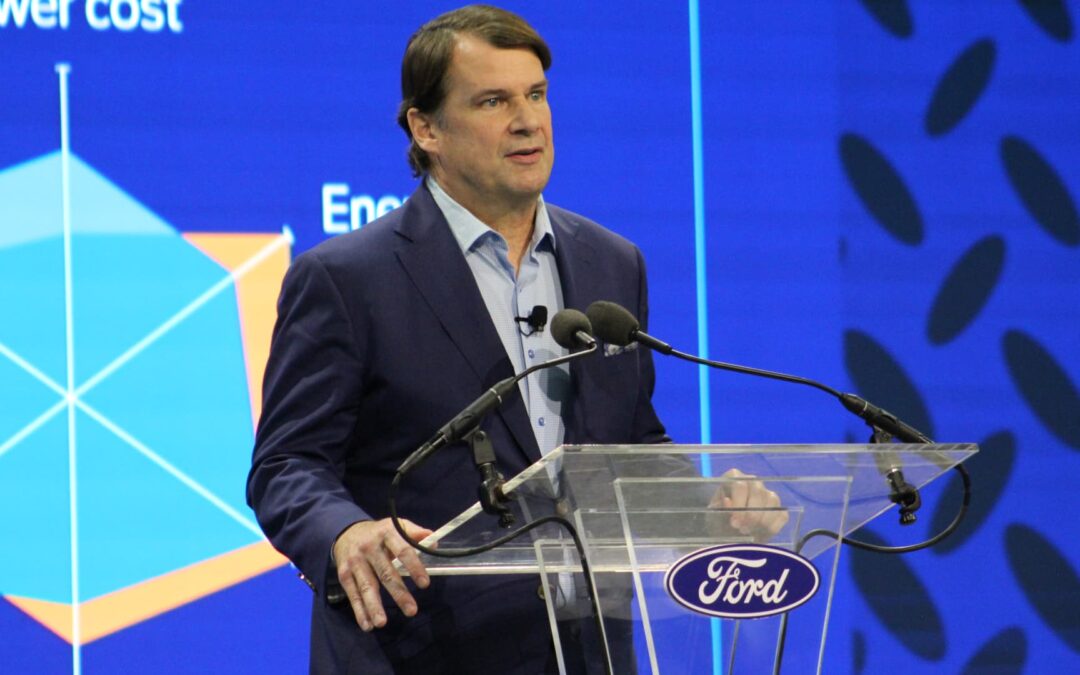Ford CEO Jim Farley at a battery lab for the automaker in suburban Detroit, announcing a new $3.5 billion electric vehicle battery plant in the state to produce lithium iron phosphate batteries, Feb. 13, 2023.
Michael Wayland/CNBC
DETROIT – Ford Motor is delaying production of a new all-electric large SUV and pickup truck, as it shifts to offer hybrid options across its entire North American lineup by 2030.
The Detroit automaker on Thursday said it will continue to invest in EVs, but it is postponing production of the three-row SUV at a plant in Canada from 2025 to 2027 to allow for the market to mature more. The pickup is being pushed back from late 2025 to 2026.
The shift in EV plans is the latest for Ford and the entire automotive industry as adoption has been slower than many expected and production costs remain high.
Ford last year said it would delay or cancel $12 billion in planned spending on new EVs due to the shifting market conditions as well as challenges to profitably building and selling the vehicles. It was not immediately clear whether the new delays were part of those plans.
“As the No. 2 EV brand in the U.S. for the past two years, we are committed to scaling a profitable EV business, using capital wisely and bringing to market the right gas, hybrid and fully electric vehicles at the right time,” Ford CEO Jim Farley said in a statement.
The three-row SUV was part of a roughly $1.3 billion investment to transition Ford’s Oakville Assembly Plant in Ontario, Canada, into a new electric vehicle hub. It was supposed to be Ford’s first time completely retooling a North American facility producing gas-powered vehicles into one that manufactures EVs.
“The additional time will allow for the consumer market for three-row EVs to further develop and enable Ford to take advantage of emerging battery technology, with the goal to provide customers increased durability and better value,” the company said in a release.
Ford said it will continue to focus its EV efforts on new plants such as its “BlueOval City” campus in Tennessee rather than transitioning current facilities producing engine-powered vehicles to all-electric models.
“Our breakthrough, next-generation EVs will be new from the ground up and fully software enabled, with ever-improving digital experiences and a multitude of potential services,” Farley said.
The automaker said the massive Tennessee facility, which was part of an $11.4 billion investment announced in 2021, will begin production of Ford’s next-generation all-electric truck, codenamed “T3,” in 2026, rather than 2025.
Ford said it is continuing construction of battery plants in Michigan, Tennessee and Kentucky.
In the first quarter of 2024, Ford’s electric vehicle sales increased by 86% from subdued levels a year earlier. Hybrid sales for the automaker rose 42% year over year, while sales of Ford’s traditional vehicles with internal combustion engines were up 2.6%.
Ford’s “Model e” electric vehicle business lost $4.7 billion in 2023, including $1.57 billion during the fourth quarter. In February, the automaker said it expected the unit to lose between $5 billion and $5.5 billion in 2024.









